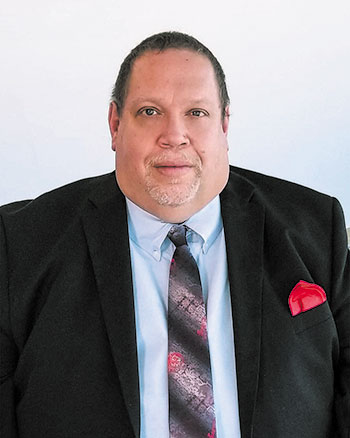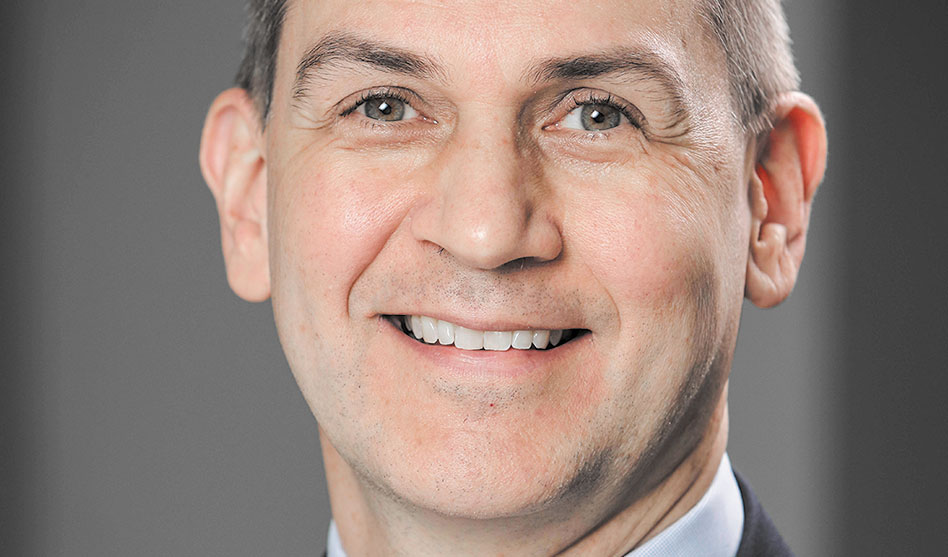Michael Herndon with Consumer Financial Protection Bureau
JAMES RUSSELL | Contributing Writer
jamesjourno@gmail.com
It’s like something out of a dream: You open the Grindr app, and the first thing you see is a message from that handsome actor on your favorite show. “Hey there,” he writes, somehow still with his 1990s six-pack abs. “Wanna talk, sexy?” He asks to exchange phone numbers. Perhaps you talk on the phone or video chat.
Then he asks you for $4,000. You send it to him.
Some would have seen the warning signs and ended the conversation way before the ask. But sometimes, people are lonely and starved for attention. Perhaps, they think, the $4,000 is a way in.
So, the transaction, performed via Western Union or Moneygram, is completed.
But then the actor disappears, taking with him your $4,000 and possibly your Social Security number, too.
That’s the type of fraud people like Breanne McClellan deal with every day and the type of fraud Sherrill Wayland warns people about.
McClellan is co-founder of Social Catfish, a company dedicated to preventing online scams through reverse search technology. Wayland is senior director of special initiatives and partnerships at SAGE, Advocacy and Services for LGBTQ+ Elders, the largest and oldest advocating for LGBTQ+ older adults.

Rafael McDonnell with Resource Center
And McClellan and Wayland agree: Don’t feel ashamed for reporting this kind of fraud. It happens.
Social Catfish recently issued its third annual State of Scams report. The report includes data from the FBI Internet Crime Complaint Center and the Federal Trade Commission, as well as a survey of 5,500 romance fraud victims in their SCF Seekers Facebook group. Adults 50 and older are the third most likely to become victims of fraud and most likely to lose the most money.
Many, especially those 65 and older, live on fixed incomes, are lonely and have dwindling social networks. “They are also targets because of a lack of tech savviness; they’re just not as experienced as younger generations,” McClellan said.
At the same time, Wayland added, many older adults rely on social media to seek friendship and relationships.
The federal government does not break down data to specifically denote LGBTQ people for privacy reasons, said Sam Levine, the director of the FTC’s Bureau of Consumer Protection. While reports are private, including the option on orientation “could possibly deter people from filing reports.”
LGBTQ older adults are also largely underserved across the country. “Not a lot of LGBTQ nonprofits focus on them; many understandably focus on youth,” Wayland said. “It makes sense because we know what it’s like to grow up and come out. But we don’t know what it’s like to age.”
That means the data about how older LGBTQ adults are impacted is anecdotal.
According to a SAGE report, 40 percent of LGBTQ older adults report fearing a shrinking support network, 34 percent live alone and 32 percent are concerned about being lonely or growing old alone. “So the senior demographic [is the perfect population to target] to reach out to and ask for money,” Wayland said.
While trends mirror those among heterosexual older adults, the LGBTQ community is highly vulnerable because some may not be out and therefore are more susceptible to blackmail, adding a layer of insecurity.
In recent years, artificial intelligence and other deceptive technologies have opened opportunities for professional fraudsters to create deepfakes or artificially created representations of someone.
“Artificial intelligence has made scams more pernicious and widespread than in the past,” Levine said. “What’s scarier is that you can now beta test and see what works and what needs refining to maximize the impact.”
Groups like Social Catfish use advanced technology to find discrepancies in voices or images. In the case of conversations with deep fakes, they use advanced tools to compare voices using snippets of celebrities’ voices with the goal of finding irregularities. Essentially, they’re using similar software to identify the fraud.
But not everyone can afford such a service. And not everyone is catfished. Some are just hacked. The city of Dallas recently was subjected to a massive ransomware attack, resulting in the release of the identities of 30,000 people and counting. That could increase the number of scams targeting people across the city.
Rafael McDonnell, communications and advocacy manager with Resource Center already tracks the latest in fraudulent activity. A world increasingly reliant on cell phones allows for new ways to scam.
While the standard calls about false Medicare benefits and charitable giving scams still exist, McDonnell warns people of the newest scams such as wrong number texts. That’s where the fraudster claims they’re trying to reach someone, lures the recipient in through fake photographs and asks for money.
“Then it turns out to be a Bitcoin scam,” McDonnell said, referring to the cryptocurrency. His advice:
“Don’t be pressured into doing what the scammers want.”
Resources
Along with Levine’s agency, SAGE collaborates with the Consumer Financial Protection Bureau’s Michael Herndon, the deputy assistant director in the Office for Older Americans. They share with LGBTQ seniors information about the extensive resources available to support them and their caregivers, including how they can prevent, recognize and report scams, fraud and financial exploitation and other needs. They’ve implemented rules to help the LGBTQ community. In March 2021, Herndon said, “The CFBP issued an interpretive rule clarifying that lenders cannot discriminate based on sexual orientation or gender identity.”
Fraudulent activity is also about a constitutional right to privacy, but there is no federal privacy law; consumer data protection has been ceded to states.
This past session, Texas became the 10th state to pass such a law. Texas Data Privacy and Security
Act by Representative Giovanni Capriglione, R-Southlake, goes into effect next year.
People have plenty of ways to file complaints or report fraud: law enforcement, attorneys and the federal or state government. While LGBTQ people sometimes feel uncomfortable reporting they were victims of fraudulent activity, advocates urge individuals to report fraud regardless.

